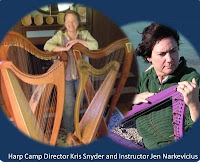 We had workshops on Composition and Improvisation, Sticky Wickets, and Putting on Airs. Students also enjoyed learning more about being creative and learned techniques to improve their creativity both at the harp and abroad! We participated in breathing and stretching exercises so we can expand our abilities to play. We also learned more tools to improve our daily practing to achieve more of our goals while wasting less time. In addition, starting from a poem, a piece of music or from scratch, students worked in small groups or alone to generate delightfully fresh music.
We had workshops on Composition and Improvisation, Sticky Wickets, and Putting on Airs. Students also enjoyed learning more about being creative and learned techniques to improve their creativity both at the harp and abroad! We participated in breathing and stretching exercises so we can expand our abilities to play. We also learned more tools to improve our daily practing to achieve more of our goals while wasting less time. In addition, starting from a poem, a piece of music or from scratch, students worked in small groups or alone to generate delightfully fresh music.We made crafts – it’s not Camp without crafts, after all! And in between we had a lovely pot luck dinner, snacks and breaks as well as a breathtaking “kasbah” where we enjoyed wine and cheese and played for one another, generating a wonderful atmosphere in which to enjoy one another’s company.
 We finished off with our traditional Harpers’ Circle, sharing the bounty of our learning and creativity with one another and then playing in ensemble all together – sharing some amazing arrangements of well known tunes, including some American classics such as Shenandoah, America the Beautiful, and the Shaker tune and some OCarolan and others.
We finished off with our traditional Harpers’ Circle, sharing the bounty of our learning and creativity with one another and then playing in ensemble all together – sharing some amazing arrangements of well known tunes, including some American classics such as Shenandoah, America the Beautiful, and the Shaker tune and some OCarolan and others.It was sad to see everyone go, but they were so enthusiastic and ready to recommit to working hard and playing well, reconnecting with other Harp Friends and making new friends, that Kris and I were glad to see them off to their respective homes - to practice of course!
If you'd like to be part of this incredible learning experience, I hope you’ll be able to join us next year. We learn so much, have so much fun, laugh a lot, and you could be a part of it. Join us in August 2011! We'll be posting more information about next year's Harp Camp on our website http://www.jeniuscreations.com/Harp_Camp.php after we've recovered from 2010 - so watch that space.




